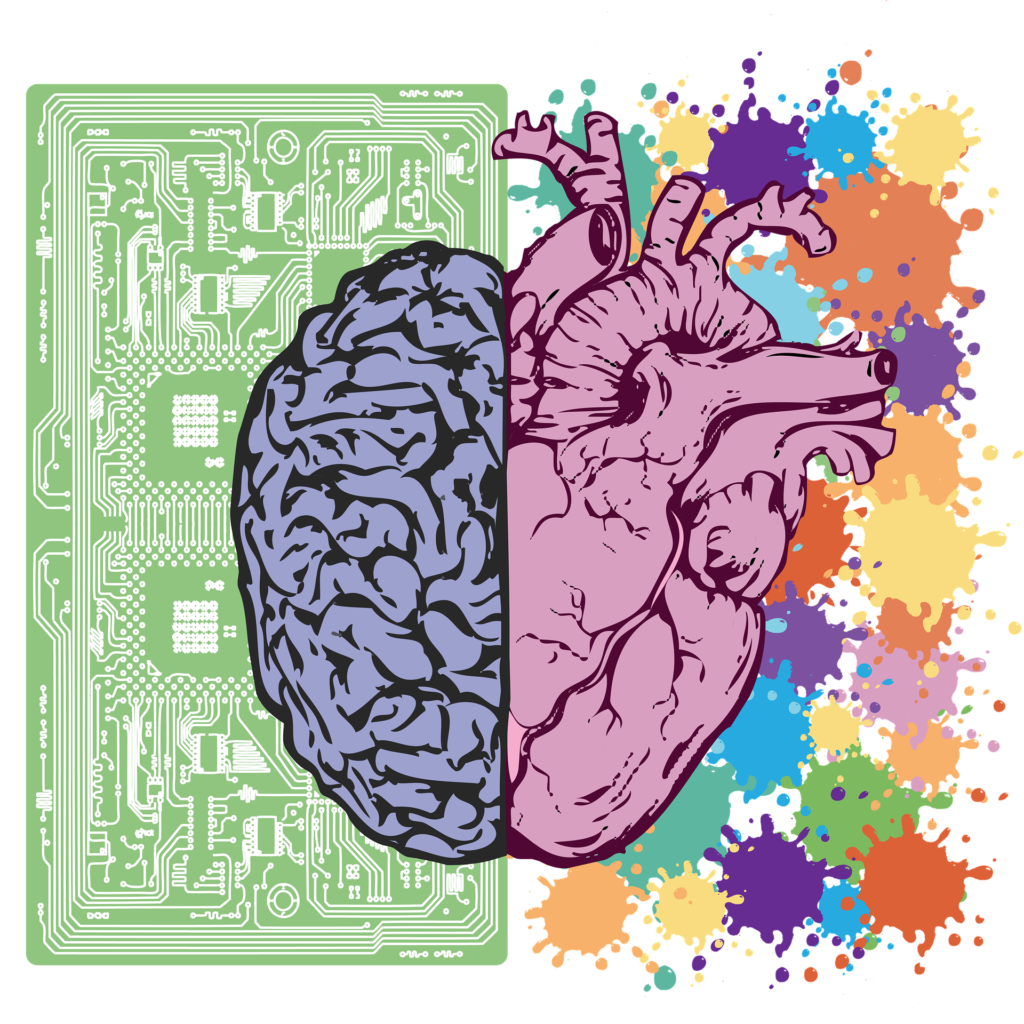
Let’s talk emotions. Welcome to Day 7 of 10 Career Challenge Actually Worth Doing. Emotional intelligence, it’s the behavior theory actually made simple by Daniel Goleman in the mid-90″s with his infamous book, “Emotional Intelligence, why it can matter more than IQ.” Its actual focus is more on soft skills vs. your actually job skills. Most importantly, how you treat others and how you treat yourself. It’s a guide to not only career success, but also having a successful personal life too.
“In a very real sense we have two minds, one that thinks and one that feels”
― Daniel Goleman, Emotional Intelligence: Why It Can Matter More Than IQ
Emotional Intelligence and Me
While in college, I interned at a corporate training center in NC. Saying I loved it is really an understatement. I learned so much. I learned how to research training topics, PowerPoint, how to effectively create training exercises and quizzes, and so much more, I am forever grateful. While interning, I got the opportunity to be introduced to emotional intelligence the next training course being developed. I was given the task of doing the research and detailing the outline of the course.
During my research I began to think about how emotional intelligence shows up in my own life. During my research I began creating my own personal exercises to do to practice. Moreover, I was learning more about how I could be a better communicator at work and at home.
Let me break it down in more detail.
Communication and Emotional Intelligence
Emotional Intelligence is no hard to explain, but it can be very challenging to do. What we are actually doing together is working with both our heart and our head. For example, when someone at work communicates trigger words to you, and you have a trigger response, the outcome is probably an unfavorable one.
Take a minute and reflect back on some heated discussions you have had with others and how did it make them feel. How did it make you feel?
“emotional self-awareness is the building block of the next fundamental emotional intelligence: being able to shake off a bad mood”
― Daniel Goleman, Emotional Intelligence: Why It Can Matter More Than IQ
When we engage in healthy emotional intelligence it’s more productive and less emotional. Emotional intelligence gathers up all your emotions and only brings them out as a mature and rational person, practiced well, you can certainly win friends and influence others. This is the behavior we want to give out to the world, and it’s how we want to be perceived in our expressions to others.
The Main 4 Components of EQ
Your mental intellect is measured much different than your emotional intellect. You can be the smartest person at your job, but have a terrible attitude, and a large ego, those traits are not the best to win over your coworkers and colleagues or gain you the promotion you may think you deserve.
There are really only 4 components to EQ, but they encompass so much more.
Let’s look at the 4 components of EQ.
- Self-Aware: How are your emotions showing up to others? How are you managing your emotions, after all they do belong to you? Can you also recognize and perceive the emotions of others? Can you draw the boundaries of the two? Can you juggle and manage the emotions before you? Have you heard the old phrase, “perception is reality”? It’s others perception of you, what you are giving out, and how you are handling how another perceives your behavior.
- Self-Management: In a nutshell, being accountable to your actions and behaviors. Do you show empahty for others, not in just one situation can you show empathy to another human being all the time. Can you rate your empathy level? Can you hold back those hateful words you want to speak when triggered? Self-regulation can be the hardest to learn. But it can be done!
- Social-Awareness: How do you communicate with others? How do you show up during conflict, stress, how are connecting with others?
- Relationship Management: Focuses on building those positive, happy, and healthy relationships. Do you always do what you say you will do? Are you a dependable person? Can people have your confidence in conversation?
Benefits of Healthy Emotional Intelligence
As you learn more about emotional intelligence, the key is understanding and regulating your emotions to your own situations and circumstances and how you react to them. Like I said, your emotions belong only to you, and you should never pawn them off on others.
We must always be aware of how we show up and show out. The benefits of learning EQ and practicing it on the regular can yield you some hefty rewards both at home and at work.
In both work and personal settings, cultivating Emotional Intelligence contributes to a harmonious and positive atmosphere. It fosters better collaboration, understanding, and overall success.
EQ Benefits at Work
- Improved Leadership Skills: Leaders with high EI tend to be more effective in guiding and inspiring their teams. They can navigate through challenges with empathy and understanding.
- Enhanced Communication: Individuals with strong EI communicate more effectively, fostering better relationships with colleagues. This can lead to a positive and collaborative work environment.
- Effective Conflict Resolution: High EI individuals are adept at managing conflicts constructively. They can navigate disagreements with diplomacy and find resolutions that satisfy all parties involved.
- Adaptability: Those with a healthy EI can adapt to changes more easily. In dynamic work environments, this adaptability is crucial for success and innovation.
- Stress Management: EI helps in managing stress by promoting self-awareness and self-regulation. This, in turn, contributes to increased resilience in the face of challenges.
EQ Benefits at Home
- Stronger Relationships: Healthy EI fosters better understanding and empathy, which are essential for maintaining strong, positive relationships with family and friends.
- Effective Parenting: Parents with high EI can better understand and respond to their children’s emotions, creating a supportive and nurturing family environment.
- Conflict Resolution in Relationships: EI plays a vital role in resolving conflicts within personal relationships, promoting open communication and understanding.
- Personal Well-being: Individuals with high EI tend to have better mental health. They can navigate their own emotions effectively, leading to greater overall well-being.
- Positive Influence: A person with strong EI can positively impact their family and friends by providing support, understanding, and encouragement.
“People with well-developed emotional skills are also more likely to be content and effective in their lives, mastering the habits of mind that foster their own productivity; people who cannot marshal some control over their emotional life fight inner battles that sabotage their ability for focused work and clear thought.”
― Daniel Goleman, Emotional Intelligence
Health Benefits of Health EQ
If you think emotional intelligence only helps you in your job and at home, it comes with some health benefits as well.
- Stress Reduction: Individuals with strong EI are better equipped to manage stress. They can identify and regulate their own emotions, which helps in preventing stress from escalating.
- Improved Mental Health: EI is linked to better mental health outcomes. It can contribute to lower levels of anxiety and depression, as individuals with high EI tend to handle emotional challenges more effectively.
- Enhanced Coping Mechanisms: People with high EI develop effective coping mechanisms. They can navigate through difficult situations, bounce back from setbacks, and maintain a positive outlook.
- Better Sleep Quality: Emotional intelligence is associated with improved sleep quality. The ability to manage emotions and avoid excessive stress contributes to better sleep patterns.
- Reduced Risk of Burnout: Individuals with high EI are less likely to experience burnout. They can navigate work-related challenges, maintain a healthy work-life balance, and prevent the negative impact of chronic stress.
- Positive Impact on Physical Health: Emotional well-being is connected to physical health. High EI individuals tend to engage in healthier behaviors, such as regular exercise and balanced nutrition, leading to overall better physical health.
- Enhanced Immune Function: There’s evidence suggesting a connection between emotional intelligence and immune function. Better emotional regulation may positively influence the immune system, contributing to overall health.
- Longevity: Some studies suggest that individuals with higher levels of EI may have a longer life expectancy. This could be attributed to the positive impact of emotional well-being on overall health.
If you’re skimming, remember this, emotional intelligence is about how you manage your emotions to yourself, others, and how it affects, your body’s health.
Final Thoughts and Words of Encouragement
We can be taught anything we want to do or be, if we put the time in. Regulating our emotions is essential to getting things done and transforming ourselves, understanding ourselves and others.
Think about it this way, there is NOT one word in any dictionary or thesaurus that has an emotion, it’s only when we speak and think, do we give the word life. So, let me ask this, how are you communicating today? Can you agree we all can do a better job at learning EQ? Will empathy play a part in your life today?
Lastly, we all are just trying to make through the day, let’s make it a great one for ourselves and shine our light to others.
We’ll chat soon,

